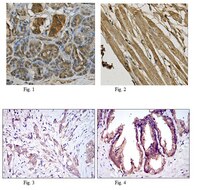MABC632 Sigma-AldrichAnti-MAP3K5 Antibody, clone 2E4
Anti-MAP3K5 Antibody, clone 2E4 is a highly specific mouse monoclonal antibody, that targets MAP3K5 & has been tested in western blotting, IHC, ICC, Flow Cytometry & ELISA.
More>> Anti-MAP3K5 Antibody, clone 2E4 is a highly specific mouse monoclonal antibody, that targets MAP3K5 & has been tested in western blotting, IHC, ICC, Flow Cytometry & ELISA. Less<<Prodotti consigliati
Panoramica
| Replacement Information |
|---|
Tabella delle specifiche principali
| Species Reactivity | Key Applications | Host | Format | Antibody Type |
|---|---|---|---|---|
| H | WB, IHC, ICC, FC, ELISA | M | Ascites | Monoclonal Antibody |
| References |
|---|
| Product Information | |
|---|---|
| Format | Ascites |
| Control |
|
| Presentation | Mouse monoclonal IgG2b ascitic fluid containing up to 0.1% sodium azide. |
| Quality Level | MQ100 |
| Physicochemical Information |
|---|
| Dimensions |
|---|
| Materials Information |
|---|
| Toxicological Information |
|---|
| Safety Information according to GHS |
|---|
| Safety Information |
|---|
| Packaging Information | |
|---|---|
| Material Size | 100 µL |
| Transport Information |
|---|
| Supplemental Information |
|---|
| Specifications |
|---|
| Global Trade Item Number | |
|---|---|
| Numero di catalogo | GTIN |
| MABC632 | 04053252910005 |
Documentation
Anti-MAP3K5 Antibody, clone 2E4 MSDS
| Titolo |
|---|
Anti-MAP3K5 Antibody, clone 2E4 Certificati d'Analisi
| Titolo | Numero di lotto |
|---|---|
| Anti-MAP3K5, clone 2E4 - VP1812286 | VP1812286 |








